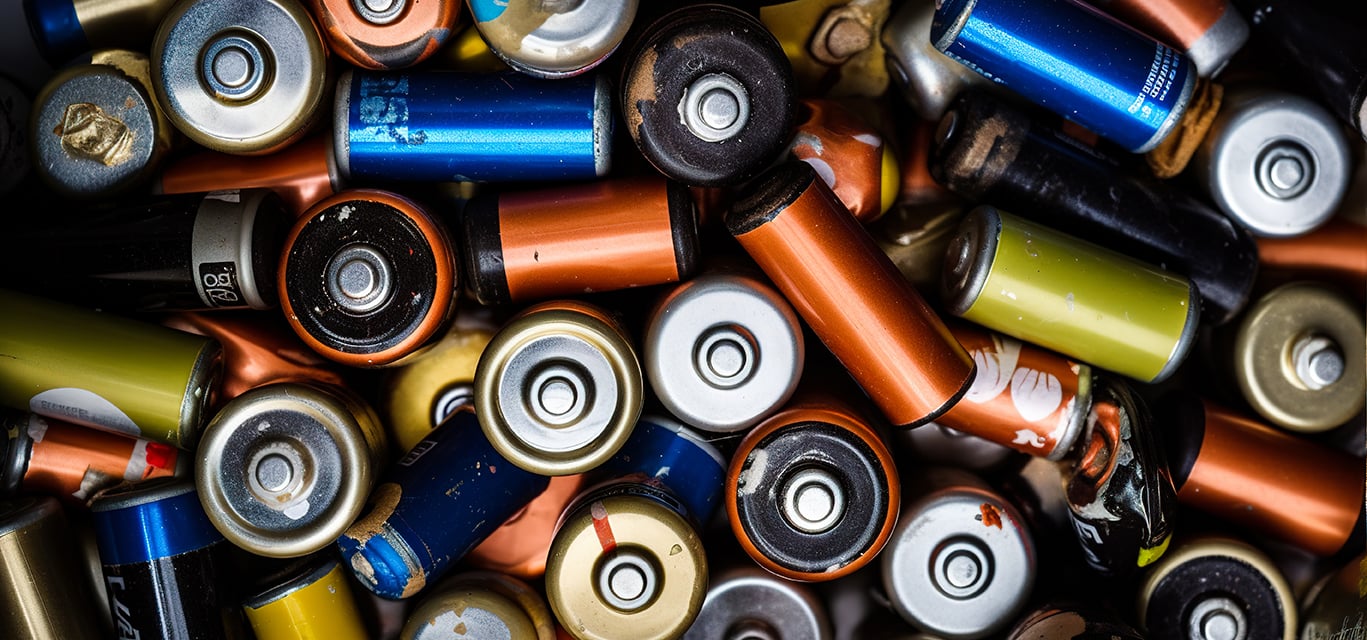
Skips are an essential part of waste management in the UK, but the presence of batteries in skips poses significant environmental and safety challenges. This blog aims to shed light on the implications of batteries in skips, addressing the potential hazards and sustainable solutions.
At the Dunmow Group we want to protect our people, vehicles, customers and property to ensure Batteries are handled in the correct way each and every day.
The Risk
Batteries contain several toxic and flammable components that can pose environmental and safety hazards if not handled and disposed of properly. Here's a detailed explanation of these components:
Toxic Components:
- Electrolytes: Batteries contain electrolytes, which are typically acidic or alkaline solutions that can be corrosive and harmful if they come into contact with the skin or eyes. Common electrolytes include sulphuric acid in lead-acid batteries and potassium hydroxide in alkaline batteries.
- Heavy Metals: Many batteries contain toxic heavy metals such as lead, mercury, cadmium, and lithium. These metals are highly hazardous to human health and the environment, especially if they leach into soil and water sources.
Flammable Components:
- Lithium: Lithium-ion batteries, commonly found in electronic devices, contain flammable lithium compounds. When damaged or exposed to extreme conditions, lithium-ion batteries can undergo thermal runaway, resulting in fires and even explosions.
- Electrolyte Ignition: The electrolyte in batteries, especially in lithium-ion batteries, is flammable. If the battery casing is breached, the electrolyte can ignite when exposed to air, leading to spontaneous combustion.
These toxic and flammable components in batteries underscore the importance of safe handling, storage, and disposal practices to prevent risks to human health, worker safety, and the environment. It is crucial to recognise the potential hazards associated with these components and take appropriate measures to minimise their impact through responsible waste and recycling practices.
Environmental Implications
Soil Contamination:
- Toxic Chemical Release: Battery leakage releases toxic substances such as lead, mercury, cadmium, and other heavy metals into the soil. These chemicals can contaminate the soil, rendering it unsuitable for agriculture and other productive uses.
- Soil Acidity: Acidic electrolytes in battery leakage can increase the soil's acidity, affecting the pH balance and nutrient availability for plants. This can lead to soil degradation and reduced plant growth.
Water Pollution:
- Aquatic Toxicity: When battery leakage enters water bodies, it releases toxic metals and chemicals, posing a significant threat to aquatic life. It can disrupt the ecosystem and harm fish, plants, and other organisms.
- Drinking Water Contamination: Battery leakage in water sources can contaminate drinking water supplies, posing a risk to human health and requiring costly treatments to ensure water safety.
Long-Term Effects:
- Bioaccumulation: Toxic substances from battery leakage can accumulate in living organisms over time, leading to health risks and long-term damage to the ecosystem.
- Ecosystem Disruption: The presence of battery leakage in the environment can disrupt natural ecosystems, leading to imbalances and reduced biodiversity.
Safety Considerations
Addressing employee and public safety regarding battery disposal risk is crucial for mitigating potential hazards. Here are key measures to ensure safety in the disposal of batteries:
Employee Safety:
- Training: Provide comprehensive training to employees involved in battery disposal, focusing on safe handling procedures, potential risks, and the use of personal protective equipment.
- Personal Protective Equipment (PPE): Supply employees with appropriate PPE such as gloves, safety glasses, and protective clothing to minimise exposure to battery chemicals during handling and disposal.
- Safe Storage: Establish designated storage areas for used batteries, ensuring proper ventilation and segregation from other materials to prevent leaks and potential hazards.
Public Safety:
- Collection Points: Set up designated collection points for public battery disposal, equipped with clear signage and instructions for safe battery drop-off.
- Education and Awareness: Educate the public about the potential hazards of battery disposal, emphasizing the importance of using approved collection facilities and avoiding improper disposal methods.
- Hazard Communication: Clearly communicate the risks associated with battery leakage and the importance of safe disposal to the public through informative materials and outreach programs.
By prioritising employee training, safety equipment, and correct storage, as well as educating the public on safe disposal practices, we can significantly minimise the risks associated with battery disposal. These measures contribute to safeguarding both employees and the public.
Conclusion:
The presence of batteries in skips presents a multifaceted challenge, encompassing environmental, safety, and regulatory aspects. By acknowledging these challenges and adopting sustainable practices, the waste management industry in the UK can mitigate the adverse effects of batteries in skips while paving the way for a more environmentally responsible approach to waste disposal.
Through collaborative efforts, including regulatory compliance, public education, and investment in recycling infrastructure, the impact of batteries in skips can be effectively managed, contributing to a cleaner and safer environment.
If you would like to discuss disposal of Batteries, our Head of Hazardous Waste, Jason Cracknell has many years experience and can provide you with a solution to meet legislative requirements and help educate your employee’s. Contact our team today on 01245 446646 or sales@dunmowgroup.com to get your FREE Waste Audit and learn how we can assist you on your waste management plans.

Dunmow House
Regiment Business Park
Eagle Way
Chelmsford, Essex, CM3 3FY
Call us: 01245 466646
Gorse Lane Industrial Estate
Stephenson Road
Clacton-On-Sea
CO15 4XA
Call us: 01255 360031
Dunmow House
Regiment Business Park
Eagle Way
Chelmsford, CM3 3FY
Call us: 01245 466646
Gorse Lane Industrial Estate
Stephenson Road
Clacton-On-Sea
CO15 4XA
Call us: 01255 360031
Morses Lane
Brightlingsea
Colchester
CO7 0SD
Call us: 01206 307070
Copyright © 2024 Dunmow Skips Ltd T/A Dunmow Group. All Rights Reserved.
No Comments Yet
Let us know what you think